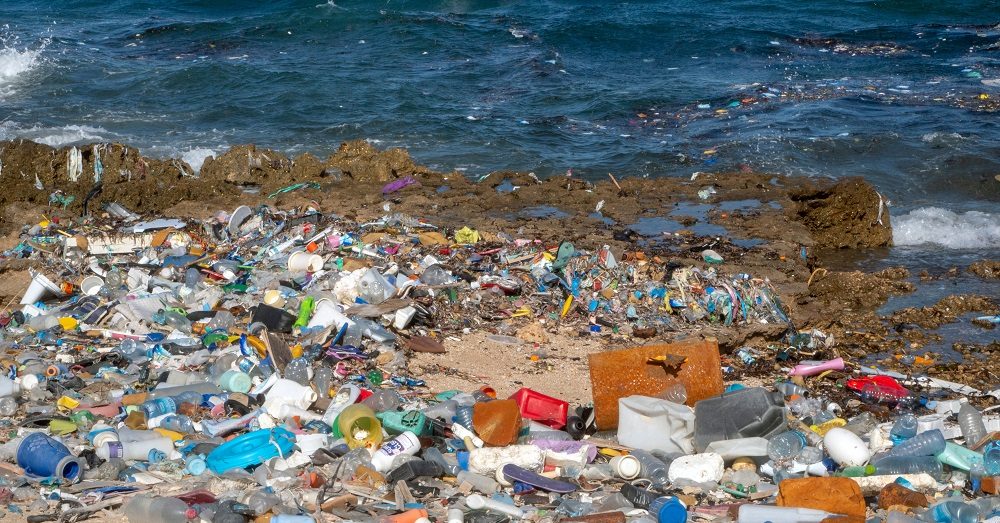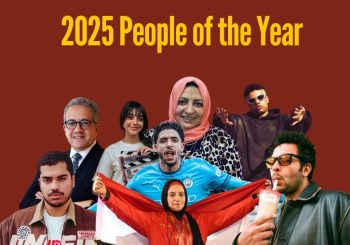Fifty years ago, plastic products did not have a grip on our lives and households as they do today. Ceramic, glass, and clay jars, like the Egyptian water jug qolla, were used for storage, and metals like copper and tin were used for cooking and preserving food. Palm leaf baskets, cloth wraps, and parchments were the go-to for shopping and packaging. Garments were made from natural fibers like wool, cotton, leather, and linen. Reuse and repair were the norm, and materials were durable and biodegradable, which is a stark contrast to today’s gruesome piles of single-use plastics, which leak toxic chemicals into our bodies and environment, silently killing nature and wildlife.
Plastic waste is projected to triple globally by 2060, from 460 million tons in 2019 to 1,231 million tons, according to the Organisation for Economic Co-operation and Development (OECD).
In August 2025, global negotiations collapsed at INC5.2, the second part of the fifth session of the United Nations’ Intergovernmental Negotiating Committee (INC), which is tasked with drafting an international legally binding treaty to curb plastic pollution, once again, following the first session last November in South Korea.
Plastic production is at the heart of the negotiations: a coalition of 100 nations, including the EU, Canada, and many African nations that are vulnerable to plastic pollution, locked horns with fossil fuel-producing countries, such as the United States, Russia, and Gulf states. The latter group rejected the inclusion of a binding target to cap plastic production in defense of their petrochemical industries, which continue to thrive on sustained global demand for plastics. As the process requires unanimous agreement, rather than a majority vote, the talks stalled.
Another disagreement also emerged over the necessity of including strong and fair financing mechanisms to ensure that “countries in the Global South receive the necessary support to achieve a “just transition toward a plastic-free future,” Farah Al Hattab, Lead Plastics Campaigner at Greenpeace Middle East and North Africa (MENA) and delegate at INC5.2, told Egyptian Streets.
Opinions were also divided on how to define the list of harmful chemicals and plastic products that should be explicitly banned under the agreement, she said.
“During the negotiations, some countries that support ambitious action at the national level could have played a stronger role by being more vocal and assertive. Meanwhile, other countries negotiated in bad faith, deliberately creating deadlocks and slowing progress,” Al Hattab noted.
“A more united, transparent, and proactive approach could have moved the talks forward more effectively…While there was visible frustration in the room over how the negotiations unfolded, that frustration reflects just how urgent and high-stakes this issue is,” she added.
Why Egypt Needs a Global Plastics Treaty
During the two-week negotiations in Geneva, from 4 to 5 August, Egypt called for a treaty that covers the lifecycle of plastic, from the design of the plastic product to the disposal and management of the waste, according to Mohamed Kamal, Director of Greenish Foundation.
However, the majority of countries that are non-plastic producers wanted the ‘lifecycle’ to be defined starting with the production and extraction of the raw material, petroleum.
Egypt is currently the Middle East’s largest producer of plastic products, with more than 12,000 plastic production facilities.
Considering the economic importance of the petrochemical industry to Egypt, surpassing four million tons of products in 2023, as well as the fact that the country is faced with serious plastic pollution challenges, it is put in “a tough crossroad”, Kamal stated. He explained that Cairo is situated between an African group seeking a strong, legally binding treaty and an Arab group advocating for a waste management treaty without any restrictions on plastic production.
At the same time, “Egypt positioned itself as a firm advocate for robust financial mechanisms that would enable Global South countries to implement the treaty fairly and effectively”, Al-Hattab said, adding that “Egypt’s negotiators…brought strong technical expertise to the negotiations.”
The Egyptian INC5.2 delegation included representatives from the ministries of foreign affairs and petroleum, along with the Federation of Egyptian Industries.
A strong global plastics treaty is crucial for the country as “Egypt faces one of the most complex plastic pollution challenges in the MENA region, with severe impacts on its environment, economy, and public health,” Al Hattab stated.
“From the Nile River to the Mediterranean and Red Sea coasts, plastic waste is damaging marine ecosystems, threatening biodiversity, and affecting key sectors like tourism and fishing, all of which are vital to Egypt’s economy and livelihoods,” she said.
Annually, 100,000 marine mammals die worldwide as a result of plastic pollution.
Egypt generates around 2.5 million tons of plastic waste annually, while consuming approximately 5 million tons. The Egyptian government spends an estimated USD 200 million (EGP 9.6 billion) each year managing solid waste. Single-use plastics make up about 40 percent of domestic plastic consumption, making them a major driver of pollution.
Moreover, many communities in Egypt, particularly those in low-income or rural areas, are disproportionately exposed to the harmful effects of plastic waste and associated toxic chemicals, Al Hattab highlighted.
Microplastics, pieces of plastic smaller than five millimeters, are also currently a major environmental and health hazard. A 2023 study published in the Journal of Sea Research showed that fish commonly consumed in Egypt have been found to contain microplastics, and in some cases, even visible plastic fragments, raising serious concerns about public health and food safety.
Humans consume up to five grams of microplastics a week, via food and water as well as breathing them in, which could end up in the brain, placenta, testicular tissues, ovarian follicular fluid, lungs, and blood.
Even though the full effects are still unknown, scientists have linked microplastics to a number of health problems, including cancer, neurotoxicity, hormone disruption, and reproductive, digestive, and respiratory issues.
A Brief History of Plastic and the Illusion of Comfort
While artificial plastic was invented in 1862, plastic started to seep into households as a mass-produced product in industrialized Western countries about a century later. By the mid-20th century, plastics were marketed as modernity in material form. Single-use plastics promised time savings, convenience, and cleanliness, creating an illusion of comfort, while externalizing waste costs to oceans, rivers, and communities.
Starting in the mid-20th century, fast-moving consumer goods (FMCG) companies, such as Coca-Cola, PepsiCo, Nestlé, Unilever, Procter & Gamble, became the largest drivers of plastic demand and waste, using it for bottles, sachets, and packaging. From 1950 to 2000, global plastic production skyrocketed from two to 234 million metric tons annually.
Internal industry documents show awareness of environmental risks for decades, yet companies continued to heavily market plastics. Petrochemical and packaging companies funded campaigns portraying plastics as ‘recyclable’, even though studies showed most plastics could not be economically recycled.
Millions of dollars are spent lobbying against bans, greenwashing, and presenting false solutions such as advanced or chemical recycling, while in reality, only nine percent of global plastic waste is recycled.
An analysis conducted by the Center for International Environmental Law (CIEL) on 7 August, during the INC5.2 negotiations, revealed that 234 international fossil fuel and chemical industry lobbyists had gained access to the talks in Geneva.
Following the collapse of the August round of negotiations (INC5.2), Egypt’s Minister of Local Development and acting Minister of Environment, Manal Awad, stressed the urgency of reaching a global agreement to combat plastic pollution, pointing to the serious risks to the environment and public health it poses.
The talks in Geneva ended without setting a date for the INC to reconvene.
“Egypt has the potential to play a leading role in the negotiations,” Al Hattab said, pointing to its national policies to combat plastic pollution, including the recently introduced Extended Producer Responsibility (EPR) and bans on certain single-use plastics.
“This treaty offers Egypt the opportunity to help shape global rules that reflect the realities and priorities of the Global South, while also protecting its own environment, people, and long-term development goals,” she said.
Al-Hattab is “cautiously optimistic” about the next round of negotiations. Greenpeace MENA, along with other civil society organizations, calls for a strong, legally binding treaty. The treaty, they hold, must include a global production reduction target, banning single-use plastics, ambitious reusing targets, and establishing robust and equitable financial mechanisms to support Egypt and other Global South countries in implementing the treaty and ensuring a just transition to a circular economy.
A global treaty has the potential to shape the future, making it healthier, cleaner. and significantly reducing overconsumption induced by unregulated private sector producers, and can “force Egypt to require a transition from its rapidly growing petrochemical industry,” Kamal stressed.
“A cleaner Nile, cleaner beaches, and safer plastic products are the true potential of this convention for Egyptians, if shaped right,” he said.







Comments (0)